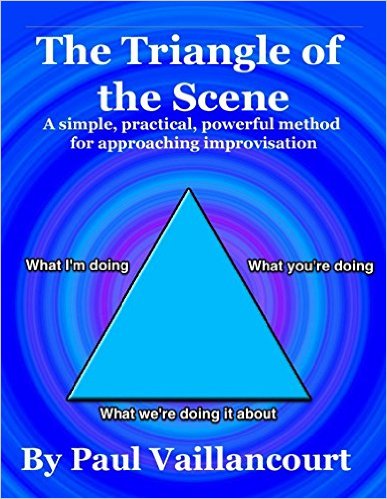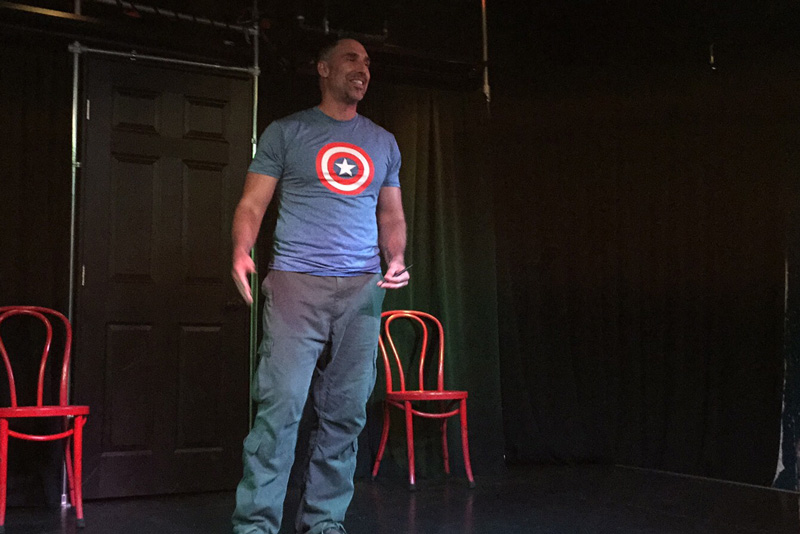By Erica Clermont
On Saturday September 12th, I rushed back from relaxing in Palm Springs to take a workshop at Finest City Improv with Paul Vaillancourt. I had met Paul previously, once at one of my first long form shows back when we did them at the Moniker Warehouse, and, next when he was an instructor at Camp ImprovUtopia my first year there. I knew he was a great teacher as everyone at camp had given his workshop on the improvised movie many accolades. As well as knowing of his reputation in LA and at iO and in the improv community in general, I was excited to learn from a great teacher.
The focus of the workshop was a principle that he calls the “Triangle of the Scene”, outlined in his book of the same title. I knew the basic concept of his idea but I was excited to hear more from him and see how the idea gets put into play in scene work.
 Our goal for the class, through learning some pretty basic techniques, was to create relationship based, game driven two person scenes that can stand on their own. Paul’s main philosophy is to always take care of your partner first and make sure that you have given them a big playable gift to work with. Big means that the gift can be played in all sorts of locations. Playable means that your partner can actually do it. In other words, make sure to make it a little broad so they can have a lot of options on how they are going to play the gift. And, it’s called a gift because your partner will be stoked to get this gift. They are excited to play the gift you have just given them. And, all you have to do is support and embrace your partner and their choices.
Our goal for the class, through learning some pretty basic techniques, was to create relationship based, game driven two person scenes that can stand on their own. Paul’s main philosophy is to always take care of your partner first and make sure that you have given them a big playable gift to work with. Big means that the gift can be played in all sorts of locations. Playable means that your partner can actually do it. In other words, make sure to make it a little broad so they can have a lot of options on how they are going to play the gift. And, it’s called a gift because your partner will be stoked to get this gift. They are excited to play the gift you have just given them. And, all you have to do is support and embrace your partner and their choices.
It’s very important to get your gifts out as soon as possible, don’t be wishy washy and beat around the bush. Be direct and bold with your gift. And play the first thing that comes along. The audience sees that first gift, make sure you do too. We have to be listening as well as the audience is because they don’t miss anything.
If you act on your gift right away, you lock it in for yourself and don’t forget it, especially if you have to bring back that character later, like in a Harold. Figure out how to play your gift and then play it. Then, all there is to do in the scene is play your game, help your partner play their game, or, you can play the activity. Scenes work best when people’s games “rub up against each other” and we are relating to each other in an honest way, especially in connection with our characters’ games. The activity of the scene grounds the characters/players and gives them something to do together, but it is not what the scene is about.
Paul also gave us another great tool. He called it the Transformation Machine. If your partner says something that is about something happening out of the scene, normally the scene tends to get derailed a bit if we focus on this. But, if we as players can see that happening and turn the statement back on your partner or yourself, relate that statement back to the relationship, and figure out what the statement says about them or you as characters, you can quickly get back to the relationship. Relationship is the most interesting thing to watch. It is up to the person who knows better to bring back the scene to each other and your relationship.
Don’t lunge after your scene, it will develop itself, especially if you are focused on the relationship.
Paul had some basic but great exercises for us that illustrated many of his points.
It’s Tuesday and You: This worked on the core skill of listening to your partner, repeating what they just said to acknowledge you are indeed listening and then giving your partner information about themselves. You can give your partner surface, emotional, or character information. Each of these is incrementally better than the one before it, but each one can provide gifts to your partner. Remember that you want your partner to succeed at playing the gift you gave them and that they should have lots to do and lots of places to go with the gift.
Every Sentence Starts with You: This was a quick exercise that focused on giving out information about your partner. Every line you said had to be to your partner about your partner. With each gift you give, your partner should be working them. If it gets off track, just go back to saying things about each other to get back on track.
Announce the Triangle: Putting a lot of what we had just learned into play. Give your partner a big, playable gift in the form of a “You” statement. One of you announces the location after the relationship has been put into play. Remember to always stick with the relationship, talk to each other about each other and everything in the scene should somehow build that relationship. Don’t lunge after your scene, it will develop itself, especially if you are focused on the relationship. Find proactive ways to play your gift, find way to make moves not just be reactive. Keep your scene in the now and show always beats tell. He also mentioned the idea of ‘Yes, in spite…’, which is saying yes to whatever is happening, in spite of what your character believes. Don’t let your character get in the way of the scene.
You are a….: Giving gifts and then discovering an object you would have that shows that gift. We did three rounds. First one was profession, you are a lawyer, then second was offering an emotional/character/point of view gift, you are sad, and third was combing the two previous types of offers, you are a sad lawyer. And as the receiver of the gifts you just needed to think of an object that you think emulates that gift or that makes it easier for you to be that sad lawyer. This is the first step in doing effective and active space work, seeing it as something related to our characters and also using it to heighten and explore the game of our character.
We then moved on to ways to pull scenes forward, which was connected to the Harold and it’s first 2 beats. There are 3 ways to pull characters forward, Character Dash, which follows one character from the first scene, Time Dash, which is following both characters and World Dash, which doesn’t follow either character but explores another part of the world that was set up in the first scene. The most important thing I gained from this was knowing that we had to play our characters games hard in the first scene and give each other big playable gifts for these scenes to be successful, and making sure we gave our partner their gift early on in the first scene. The stronger the character’s game/point of view the easier it is to play your game or play your partners’ game. Paul gave an analogy that these scenes should be more like scenes from many different episodes of the same sitcom, rather than scenes from the same episode. The first follows the world of these characters, the second is just following a story.
1st Beats/2nd Beats :
- A and B do relationship based, game driven scene.
- C and D do a new scene in that same world. (World Dash)
- A and E do a Character Dash following A’s character.
- B and F do a Character Dash following B’s character.
- A and B do a Time Dash scene exploring/following the original characters.
This exercise gets you into the mindset of really exploring different ways the second round/beats of scenes can go. I found this very helpful being that I am on our house Harold team and can’t wait to put more of Paul’s philosophy into play in our next set!
I found this workshop helpful for practicing creating relationship-based game-driven scenes. Stay in the moment, develop the scene together, talk to each other about each other, and just enjoy the discovery of what is happening. Improv is the intersection between discovery and decision.

